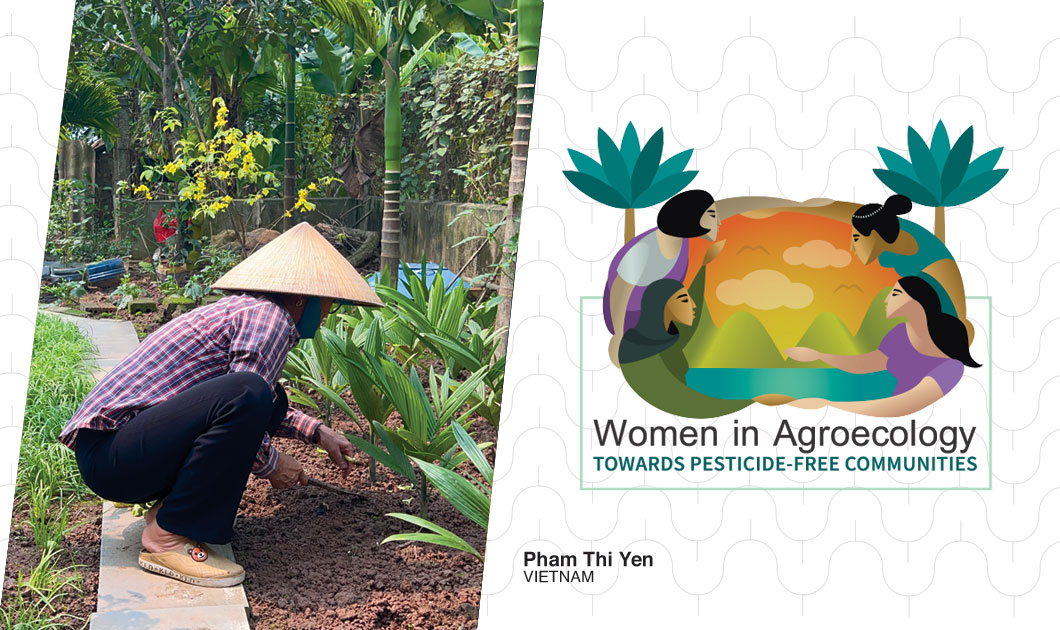Mrs. Pham Thi Yen, is a 60-year-old resident of Hamlet 6 in Hai Cuong commune, Hai Hau district, Nam Dinh province. She was once a dedicated local health worker at the Hai Cuong commune health centre. After three decades of service, she retired five years ago. However, retirement didn’t slow her down. Instead, she redirected her energy towards farming alongside her husband.
On their five acres of rice fields and another five acres dedicated to crops and vegetables, Yen and her husband cultivate various produce ranging from seasonal fruits to vibrant vegetables. Their efforts spread beyond self-sufficiency. They often share or sell their surplus to neighbours or even the local markets.
Unlike many conventional farmers, Yen made a conscious decision over a decade ago to abandon the use of pesticides in favour of natural alternatives. She has been using homemade solutions like garlic-chilli pepper concoctions and prioritized the health of her family as well as the integrity of her produce. Reflecting on her transition, Yen remarked, “Pesticides are a thing of the past. Now, with a deeper understanding and community awareness, I prioritize the safety of our health and the quality of our agricultural products.”
In addition to her pesticide-free approach, Yen practices sustainable waste management on her farm. Utilizing compost pits to recycle organic waste into nutrient-rich fertilizer, she exemplifies the principles of agroecology.
Moreover, Yen actively engages in community initiatives, sharing her knowledge and experiences with fellow farmers. As a dedicated member of the pioneering rural female farmer group in Hai Cuong commune since 2020, Yen has been at the forefront of the local peasant movement. Drawing from her 30 years of experience at the commune health centre, she is acutely aware of the dire consequences of pesticide overuse, motivating her family to transition to agroecological practices.
Yet, this shift wasn’t an easy walk in the park. Yen candidly shares her initial apprehensions, which were fueled by the sight of neighbours spraying pesticides. She feared their produce would outshine hers, worrying about pests migrating from their fields to hers. Moreover, embracing agroecology meant grappling with higher costs for biological pesticides and investing time in crafting homemade remedies from ginger, garlic, and chilli peppers. However, her conviction in safeguarding her health and her loved ones prevailed.
And so, she persevered, until her soil has become richer, devoid of the harmful residues left behind by chemical fertilizers and pesticides. As the Vietnamese proverb goes, “A bird would perch in a safe place”, her pesticide-free haven has become a sanctuary for wildlife, attracting birds with its lush greenery and absence of toxic odours.
Eager to share what she learned, Yen actively engages fellow farmers in her community, advocating for the adoption of sustainable practices. Her approach is rooted in thoughtful communication and hands-on guidance, emphasizing the need for tailored, small-group discussions and practical field trips.
In her relentless pursuit of agroecology, Yen underscores the importance of persistent advocacy. She recognizes that effecting change requires continuing education and a patient and inclusive approach. Through her leadership and unwavering commitment, Yen tends to the earth and paves the way for a greener, healthier future for her community.###
Women In Agroecology: Towards Pesticide-Free Communities is a continuing storytelling initiative of PAN Asia Pacific and its partners to document stories of rural women who are survivors of pesticide poisoning and/or making the transition to agroecology.
Our contributing partners for the second installation: Shikkha Shastha Unnayan Karzakram (SHISUK), Bangladesh; Serikat Perempuan Indonesia (SERUNI); Sustainable Agriculture and Environment Development Association (SAEDA), Laos; and Research Centre for Gender, Family and Environment in Development (CGFED), Vietnam








Discussion about this post